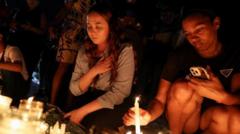A tragic incident at a football match in Guinea has led to devastating consequences, with human rights groups claiming that over 135 people, many of whom are children, were killed in a crowd crush. The military government disputes these claims, emphasizing a smaller official death toll. Investigations are underway amid rising tensions over accountability, as the nation mourns its loss.
Guinea Stadium Tragedy: Conflicting Reports Claim Hundreds Dead in Football Match Crush

Guinea Stadium Tragedy: Conflicting Reports Claim Hundreds Dead in Football Match Crush
Human rights groups allege over 135 fatalities in a stadium crush in Nzérékoré, challenging the government's official count of 56.
In a devastating turn of events, human rights organizations in Guinea claim that more than 135 football fans were killed in a crowd crush that occurred at the Nzérékoré stadium on Sunday, predominantly affecting children. This shocking estimate starkly contrasts with the government’s official count of 56 confirmed fatalities, raising serious concerns about accurate reporting and accountability in the aftermath of the tragedy.
The organizations based their casualty figures on testimonies gathered from hospitals, cemeteries, local media, and families impacted by the incident. An additional report suggests that over 50 individuals remain unaccounted for following the event. However, the military government has reacted firmly, cautioning citizens against disseminating "unverified" information while investigations into the tragic circumstances are still in progress. Justice Minister Yaya Kaïraba Kaba confirmed that the judiciary would be investigating those considered responsible for the chaos, while threatening legal action against those who share unfounded claims.
Witness accounts attribute the deaths to a controversial refereeing decision during the match, which incited violent clashes. The police's response involved deploying tear gas, exacerbating the chaos as attendees attempted to escape. Rights groups have pointed fingers at both the event organizers and Guinea’s military rulers for their failure to manage the situation effectively, noting that the excessive use of gas in a confined space led to the crush, while vehicles carrying officials further aggravated the exodus of fleeing crowds.
Prime Minister Mamadou Oury Bah announced a three-day period of national mourning for the victims. Government spokesperson Ousmane Gaoual emphasized the importance of respecting this mourning period and addressed the inconsistency in casualty figures, stating that provisional numbers were subject to change and did not denote a contradiction.
Local journalists reported that the stadium was overcrowded, filled to its capacity with thousands of attendees, and noted that the venue had limited evacuation options with only a small exit available. Guinea, sharing a dire reputation with several other African nations regarding international football event standards, has been barred from hosting such matches due to safety concerns. Countries including Ethiopia, Gambia, Chad, and Sierra Leone have similarly faced international prohibitions.
As the country grapples with the fallout and pain from this tragic incident, the contrasting narratives of the government and human rights groups reflect deeper issues of accountability and the need for systematic reforms in sports safety measures.





















